2022高考英语二轮总复习专题六非谓语动词(学案含解析)
文档属性
| 名称 | 2022高考英语二轮总复习专题六非谓语动词(学案含解析) | 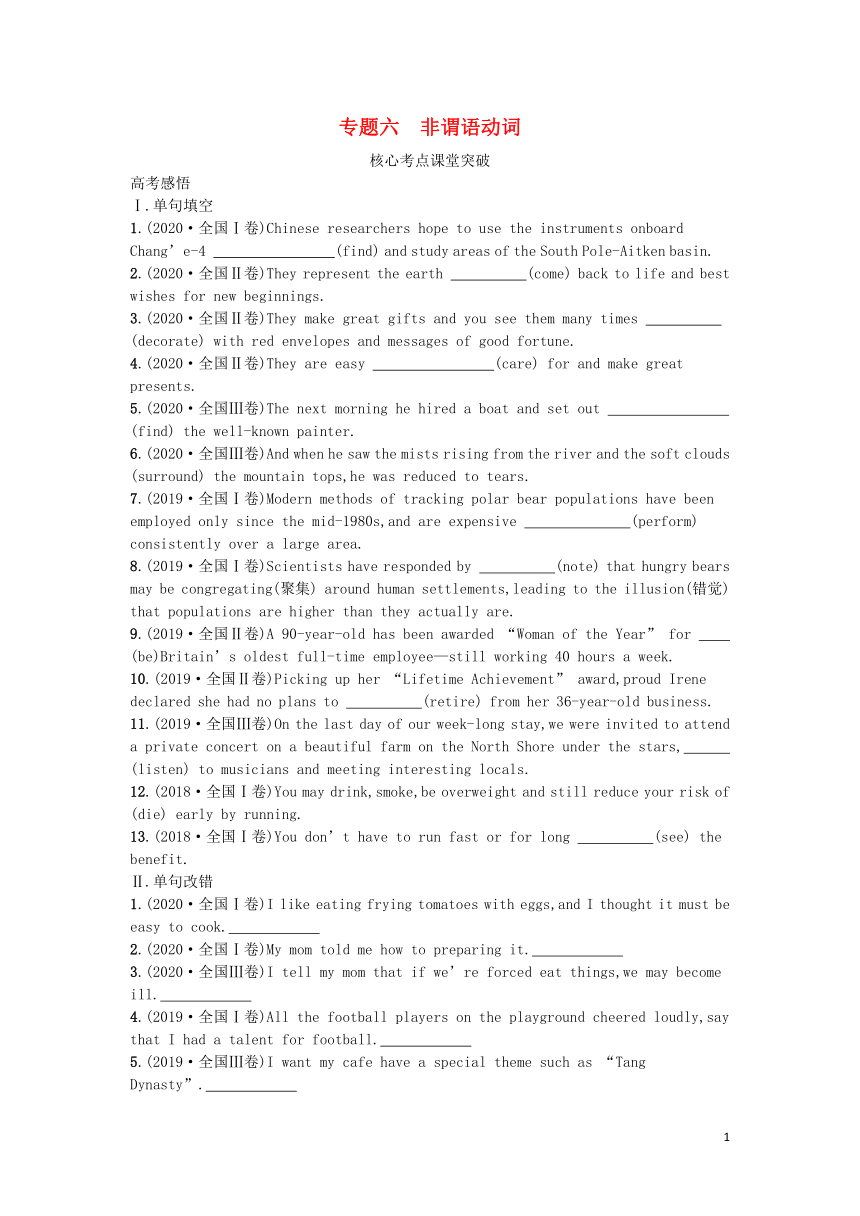 | |
| 格式 | zip | ||
| 文件大小 | 56.2KB | ||
| 资源类型 | 教案 | ||
| 版本资源 | 外研版 | ||
| 科目 | 英语 | ||
| 更新时间 | 2021-08-30 10:58:49 | ||
图片预览

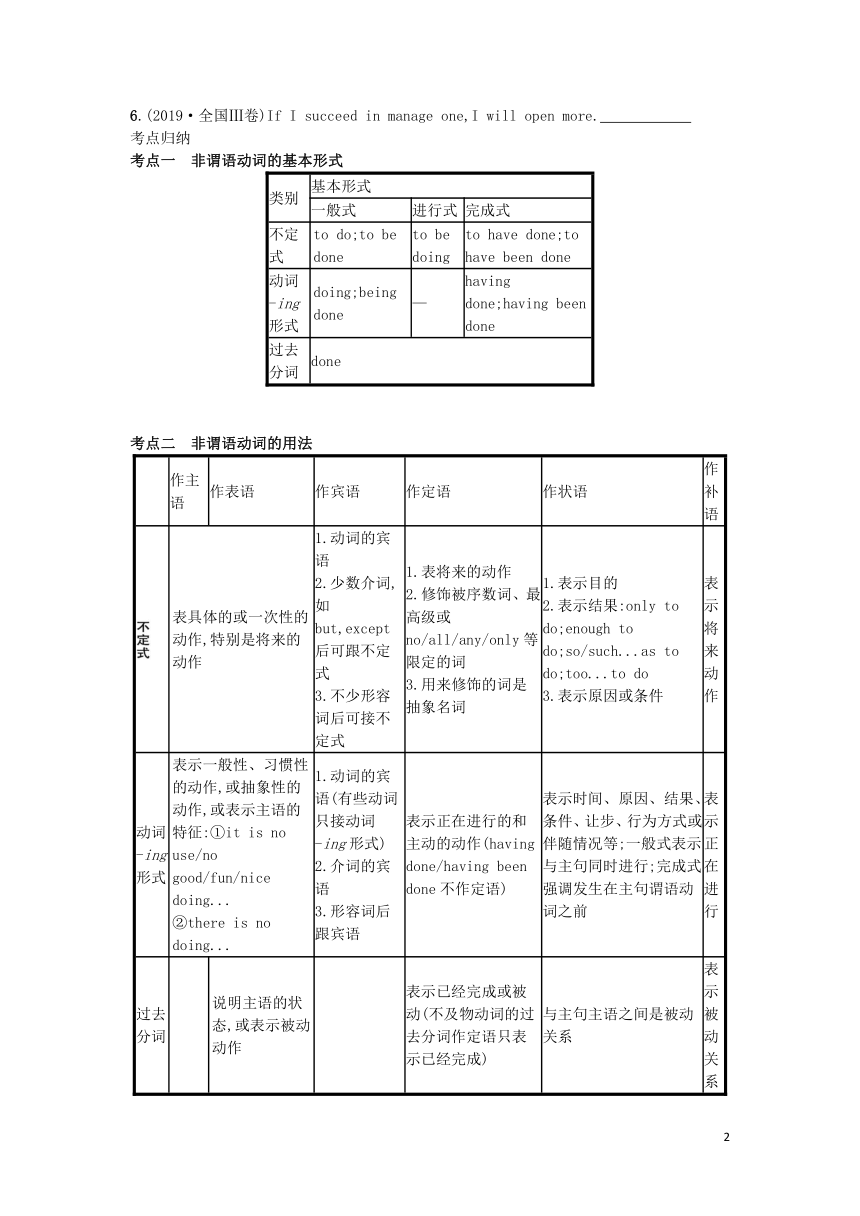
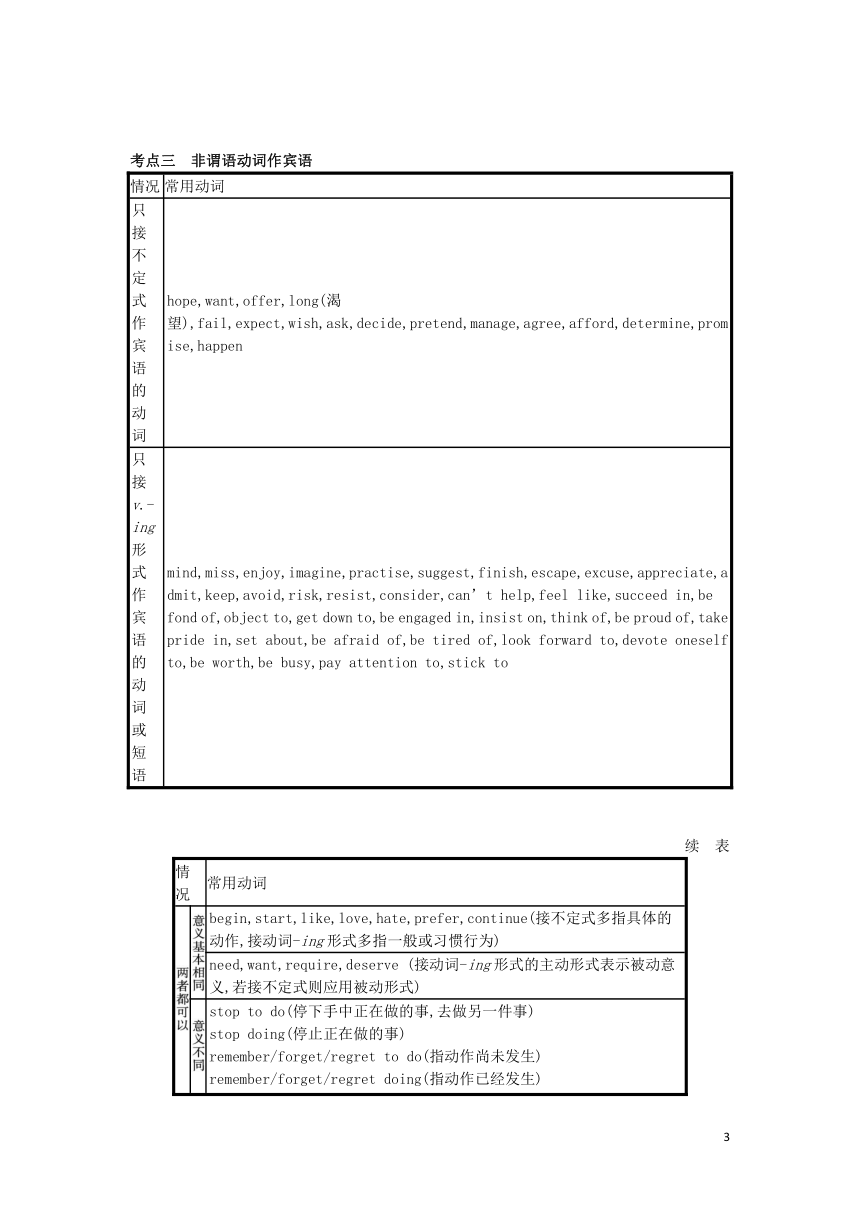
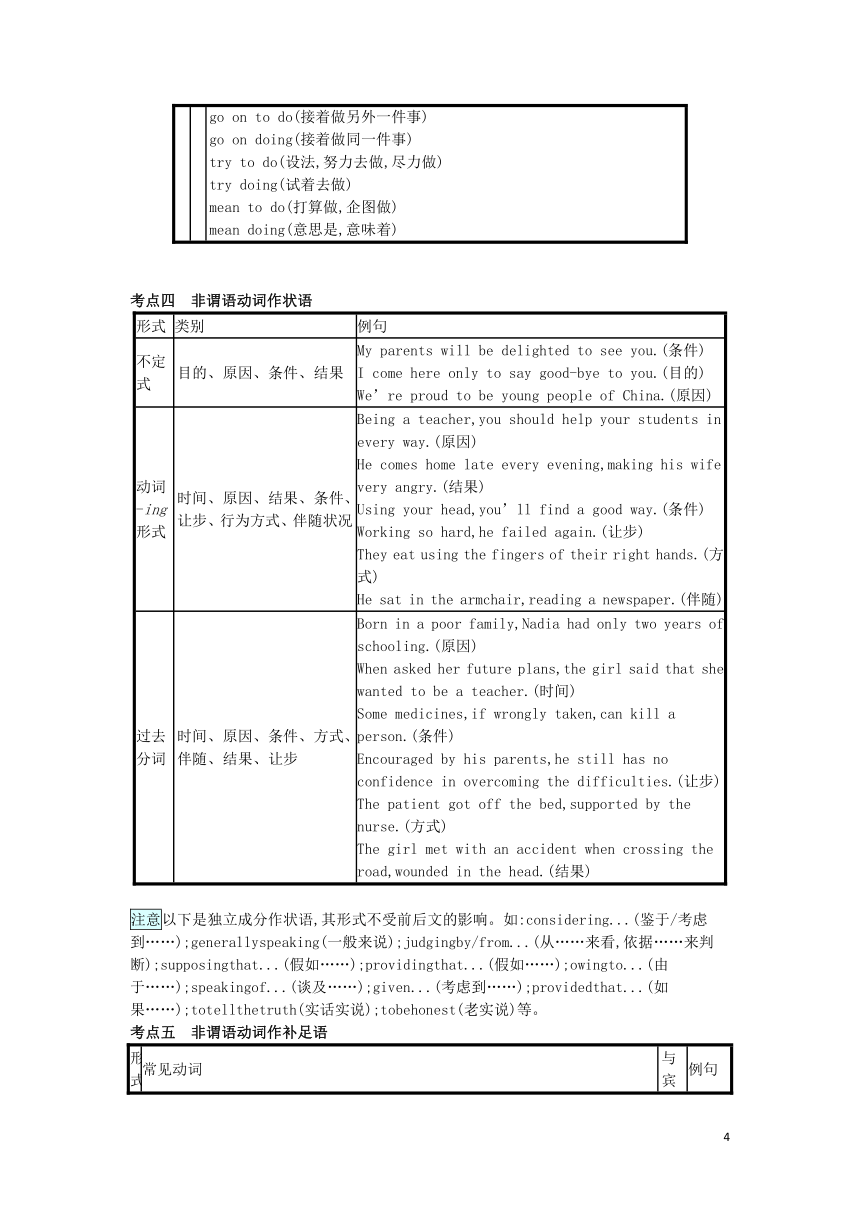
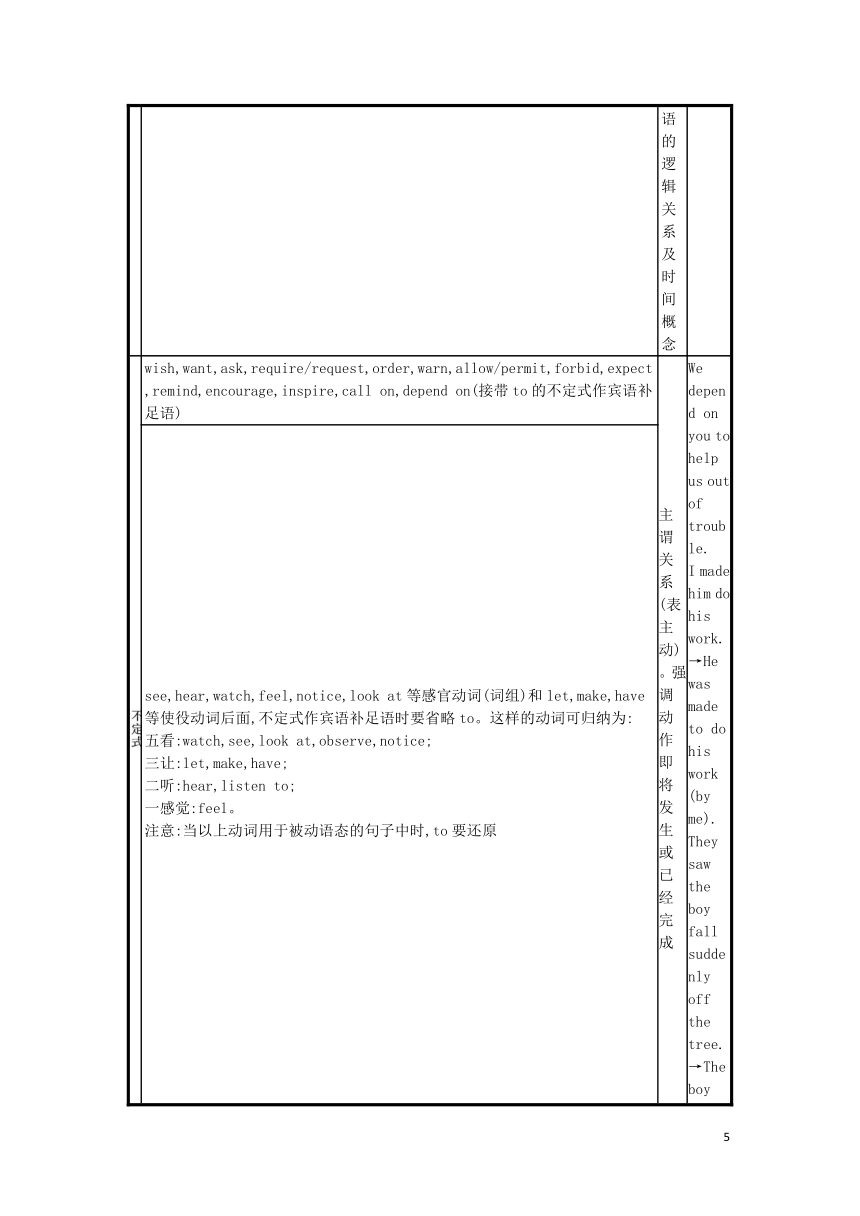
文档简介
专题六 非谓语动词
核心考点课堂突破
高考感悟
Ⅰ.单句填空
1.(2020·全国Ⅰ卷)Chinese
researchers
hope
to
use
the
instruments
onboard
Chang’e-4
(find)
and
study
areas
of
the
South
Pole-Aitken
basin.?
2.(2020·全国Ⅱ卷)They
represent
the
earth
(come)
back
to
life
and
best
wishes
for
new
beginnings.?
3.(2020·全国Ⅱ卷)They
make
great
gifts
and
you
see
them
many
times
(decorate)
with
red
envelopes
and
messages
of
good
fortune.?
4.(2020·全国Ⅱ卷)They
are
easy
(care)
for
and
make
great
presents.?
5.(2020·全国Ⅲ卷)The
next
morning
he
hired
a
boat
and
set
out
(find)
the
well-known
painter.?
6.(2020·全国Ⅲ卷)And
when
he
saw
the
mists
rising
from
the
river
and
the
soft
clouds
(surround)
the
mountain
tops,he
was
reduced
to
tears.?
7.(2019·全国Ⅰ卷)Modern
methods
of
tracking
polar
bear
populations
have
been
employed
only
since
the
mid-1980s,and
are
expensive
(perform)
consistently
over
a
large
area.?
8.(2019·全国Ⅰ卷)Scientists
have
responded
by
(note)
that
hungry
bears
may
be
congregating(聚集)
around
human
settlements,leading
to
the
illusion(错觉)
that
populations
are
higher
than
they
actually
are.?
9.(2019·全国Ⅱ卷)A
90-year-old
has
been
awarded
“Woman
of
the
Year”
for
(be)Britain’s
oldest
full-time
employee—still
working
40
hours
a
week.?
10.(2019·全国Ⅱ卷)Picking
up
her
“Lifetime
Achievement”
award,proud
Irene
declared
she
had
no
plans
to
(retire)
from
her
36-year-old
business.?
11.(2019·全国Ⅲ卷)On
the
last
day
of
our
week-long
stay,we
were
invited
to
attend
a
private
concert
on
a
beautiful
farm
on
the
North
Shore
under
the
stars, (listen)
to
musicians
and
meeting
interesting
locals.?
12.(2018·全国Ⅰ卷)You
may
drink,smoke,be
overweight
and
still
reduce
your
risk
of
(die)
early
by
running.?
13.(2018·全国Ⅰ卷)You
don’t
have
to
run
fast
or
for
long
(see)
the
benefit.?
Ⅱ.单句改错
1.(2020·全国Ⅰ卷)I
like
eating
frying
tomatoes
with
eggs,and
I
thought
it
must
be
easy
to
cook. ?
2.(2020·全国Ⅰ卷)My
mom
told
me
how
to
preparing
it. ?
3.(2020·全国Ⅲ卷)I
tell
my
mom
that
if
we’re
forced
eat
things,we
may
become
ill. ?
4.(2019·全国Ⅰ卷)All
the
football
players
on
the
playground
cheered
loudly,say
that
I
had
a
talent
for
football. ?
5.(2019·全国Ⅲ卷)I
want
my
cafe
have
a
special
theme
such
as
“Tang
Dynasty”. ?
6.(2019·全国Ⅲ卷)If
I
succeed
in
manage
one,I
will
open
more. ?
考点归纳
考点一 非谓语动词的基本形式
类别
基本形式
一般式
进行式
完成式
不定式
to
do;to
be
done
to
be
doing
to
have
done;to
have
been
done
动词
-ing形式
doing;being
done
—
having
done;having
been
done
过去分词
done
考点二 非谓语动词的用法
作主语
作表语
作宾语
作定语
作状语
作补语
表具体的或一次性的动作,特别是将来的动作
1.动词的宾语
2.少数介词,如but,except后可跟不定式
3.不少形容词后可接不定式
1.表将来的动作
2.修饰被序数词、最高级或no/all/any/only等限定的词
3.用来修饰的词是抽象名词
1.表示目的
2.表示结果:only
to
do;enough
to
do;so/such...as
to
do;too...to
do
3.表示原因或条件
表示将来动作
动词-ing
形式
表示一般性、习惯性的动作,或抽象性的动作,或表示主语的特征:①it
is
no
use/no
good/fun/nice
doing...
②there
is
no
doing...
1.动词的宾语(有些动词只接动词-ing形式)
2.介词的宾语
3.形容词后跟宾语
表示正在进行的和主动的动作(having
done/having
been
done不作定语)
表示时间、原因、结果、条件、让步、行为方式或伴随情况等;一般式表示与主句同时进行;完成式强调发生在主句谓语动词之前
表示正在进行
过去分词
说明主语的状态,或表示被动动作
表示已经完成或被动(不及物动词的过去分词作定语只表示已经完成)
与主句主语之间是被动关系
表示被动关系
考点三 非谓语动词作宾语
情况
常用动词
只接不定式作宾语的动词
hope,want,offer,long(渴望),fail,expect,wish,ask,decide,pretend,manage,agree,afford,determine,promise,happen
只接v.-ing形式作宾语的动词或短语
mind,miss,enjoy,imagine,practise,suggest,finish,escape,excuse,appreciate,admit,keep,avoid,risk,resist,consider,can’t
help,feel
like,succeed
in,be
fond
of,object
to,get
down
to,be
engaged
in,insist
on,think
of,be
proud
of,take
pride
in,set
about,be
afraid
of,be
tired
of,look
forward
to,devote
oneself
to,be
worth,be
busy,pay
attention
to,stick
to
续 表
情况
常用动词
begin,start,like,love,hate,prefer,continue(接不定式多指具体的动作,接动词-ing形式多指一般或习惯行为)
need,want,require,deserve
(接动词-ing形式的主动形式表示被动意义,若接不定式则应用被动形式)
stop
to
do(停下手中正在做的事,去做另一件事)
stop
doing(停止正在做的事)
remember/forget/regret
to
do(指动作尚未发生)
remember/forget/regret
doing(指动作已经发生)
go
on
to
do(接着做另外一件事)
go
on
doing(接着做同一件事)
try
to
do(设法,努力去做,尽力做)
try
doing(试着去做)
mean
to
do(打算做,企图做)
mean
doing(意思是,意味着)
考点四 非谓语动词作状语
形式
类别
例句
不定式
目的、原因、条件、结果
My
parents
will
be
delighted
to
see
you.(条件)
I
come
here
only
to
say
good-bye
to
you.(目的)
We’re
proud
to
be
young
people
of
China.(原因)
动词
-ing
形式
时间、原因、结果、条件、让步、行为方式、伴随状况
Being
a
teacher,you
should
help
your
students
in
every
way.(原因)
He
comes
home
late
every
evening,making
his
wife
very
angry.(结果)
Using
your
head,you’ll
find
a
good
way.(条件)
Working
so
hard,he
failed
again.(让步)
They
eat
using
the
fingers
of
their
right
hands.(方式)
He
sat
in
the
armchair,reading
a
newspaper.(伴随)
过去
分词
时间、原因、条件、方式、伴随、结果、让步
Born
in
a
poor
family,Nadia
had
only
two
years
of
schooling.(原因)
When
asked
her
future
plans,the
girl
said
that
she
wanted
to
be
a
teacher.(时间)
Some
medicines,if
wrongly
taken,can
kill
a
person.(条件)
Encouraged
by
his
parents,he
still
has
no
confidence
in
overcoming
the
difficulties.(让步)
The
patient
got
off
the
bed,supported
by
the
nurse.(方式)
The
girl
met
with
an
accident
when
crossing
the
road,wounded
in
the
head.(结果)
注意以下是独立成分作状语,其形式不受前后文的影响。如:considering...(鉴于/考虑到……);generallyspeaking(一般来说);judgingby/from...(从……来看,依据……来判断);supposingthat...(假如……);providingthat...(假如……);owingto...(由于……);speakingof...(谈及……);given...(考虑到……);providedthat...(如果……);totellthetruth(实话实说);tobehonest(老实说)等。
考点五 非谓语动词作补足语
形式
常见动词
与宾语的逻辑关系及时间概念
例句
wish,want,ask,require/request,order,warn,allow/permit,forbid,expect,remind,encourage,inspire,call
on,depend
on(接带to的不定式作宾语补足语)
主谓关系(表主动)。强调动作即将发生或已经完成
We
depend
on
you
to
help
us
out
of
trouble.
I
made
him
do
his
work.
→He
was
made
to
do
his
work
(by
me).
They
saw
the
boy
fall
suddenly
off
the
tree.
→The
boy
was
seen
to
fall
suddenly
off
the
tree.
see,hear,watch,feel,notice,look
at等感官动词(词组)和let,make,have等使役动词后面,不定式作宾语补足语时要省略to。这样的动词可归纳为:
五看:watch,see,look
at,observe,notice;
三让:let,make,have;
二听:hear,listen
to;
一感觉:feel。
注意:当以上动词用于被动语态的句子中时,to要还原
续 表
形式
常见动词
与宾语的逻辑关系及时间概念
例句
动词
-ing
形式
notice,see,watch,hear,find,keep,have,feel
主谓关系(表主动)。强调动作正在进行,尚未完成
I
found
her
listening
to
the
radio
when
I
passed
by.
过去
分词
动宾关系(表被动)。动作已经完成,多强调状态
We
found
the
village
greatly
changed.
注意find,leave(使……处于某种状态),keep(使……保持某种状态)后一般跟动词-ing形式和过去分词作补足语,而不跟动词不定式。
Whatyousaidleftmethinking.
你所说的令我思考。
考点六 非谓语动词作定语
1.不定式作定语
不定式作定语可表示该动作尚未发生;被修饰的词为ability,chance,idea,fact,promise,attempt,belief等抽象名词时,一般用不定式作定语;不定式常用于不定代词或被the
first/next/only/last等修饰的名词后作定语;如果作定语的不定式与被修饰的名词之间存在逻辑上的动宾关系,在不及物动词后通常要加上适当的介词。
The
airport
tobecompleted
next
year
will
help
promote
tourism
in
this
area.
明年要竣工的飞机场将有助于促进这个地区的旅游业。
He
has
a
chance
and
has
become
the
first
togo
abroad
in
our
town.
他拥有一个机会而且已经成为我们镇上第一个出国的人。
He
wanted
to
find
a
house
tolivein.
他想找个房子住。
2.动词-ing形式作定语
当被修饰的名词与非谓语动词之间为主动关系时用动词-ing形式;当为被动关系且表示动作正在进行时用being
done的形式;当被修饰的名词与非谓语动词之间为被动关系且动作已经完成时要用having
been
done的形式,having
been
done不作定语。动词-ing形式作定语一般要求其动作与谓语动词所表示的动作同时发生或在说话时该动作正在进行,否则就用定语从句。动词-ing形式作定语表示被修饰词的用途时,与被修饰词之间不存在逻辑上的主谓关系。
Today
there
are
more
airplanes
carrying
more
people
than
ever
before
in
the
skies.
与以前相比,现在天空中有更多的飞机来运送更多的乘客。
The
houses
beingbuilt
are
for
the
students.
正在盖的这些房子是给学生的。
A
sleeping
pill
will
help
you
to
fall
asleep
quickly.
安眠药会帮助你很快入睡。
3.过去分词作定语
动词-ed形式作定语与被修饰词之间存在逻辑上的动宾关系,表示动作已完成。及物过去分词作定语表示被动和完成,少数不及物过去分词作定语只表示完成,不表被动。
The
retired
worker
is
sweeping
the
fallen
leaves
on
the
road.
这位退休工人正在扫路上的落叶。
考点七 独立主格结构
名词(代词)+
动词-ing
形式
The
clock
striking
twelve,I
went
to
bed.(表原因)
名词(代词)+
过去分词
He
lay
on
his
back
in
bed,his
hands
crossed
under
his
head.(表伴随)
Enough
time
given,she
will
surely
do
the
job
better.(表条件)
名词(代词)+
不定式
Here
are
the
first
three
volumes,the
fourth
one
to
come
out
next
month.(表伴随)
He
proposed
a
picnic,he
himself
to
pay
for
the
railway
tickets
and
John
to
provide
the
food.(表方式)
名词(代词)+
形容词短语
Her
face
pale
with
anger,she
rose
to
go
away.(表原因)
I
saw
a
deep
pond,the
water
blue
like
the
sky.(表结果)
名词(代词)
+介词短语
Then,last
night,I
followed
him
here
and
climbed
in,sword
in
hand.(表方式)
Child
in
arms,a
few
women
stood
there
chatting.(表方式)
名词(代词)
+副词短语
Summer
over,the
students
returned
to
school.(表原因)
名词(代词)
+名词短语
His
first
shot
a
failure,Tom
fired
again.(表原因)
考点八 with的复合结构
with+宾语
+形容词
The
children
were
listening
to
the
teacher
with
their
eyes
wide
open.(表伴随)
with+宾语
+介词短语
The
old
man
used
to
take
a
walk
with
a
stick
in
his
hand.(表方式)
with+宾
语+副词
The
proud
girl
walked
away
with
her
head
up.(表方式)
with+宾语
+动词-ing
形式
Mary
felt
very
shy
with
so
many
eyes
looking
at
her.(表原因)
with+宾语
+过去分词
If
you
sit
looking
away
from
a
person,or
with
your
back
turned,you
are
saying
you
are
not
interested
in
that
person.(表方式)
with+宾语
+不定式
With
too
much
work
to
do
the
next
day,he
felt
anxious
and
didn’t
sleep
well.(表原因)
考点九 不定式的主动形式表示被动含义
be+表示特征、性质的形容词+不定式
不定式中动词要用主动式,且是及物动词或是“不及物动词+介词”的形式
常用形容词有:easy,hard,difficult,important,impossible,interesting,pleasant,nice,comfortable,safe,dangerous,cheap,fit,heavy,happy,glad,sorry,lucky,surprised,angry,able,right,ready,clever,foolish,quick,slow,polite,wrong
续 表
疑问词+不定式
I
don’t
know
what
to
do.
be+不定式
blame/seek/let
He
is
to
blame
for
the
accident.
专项训练巩固提升
Ⅰ.单句填空
1. (dress)
in
a
white
uniform,he
looks
more
like
a
cook
than
a
doctor.?
2.I
couldn’t
do
my
homework
with
all
that
noise
(go)
on.?
3.Tom
sounds
very
much
(interest)
in
the
job,but
I’m
not
sure
whether
he
can
manage
it.?
4.He
hurried
to
the
station
only
(find)
that
the
train
had
left.?
5.The
repairs
cost
a
lot,but
it’s
money
well
(spend).?
6. (find)
the
course
very
difficult,she
decided
to
move
to
a
lower
level.?
7. (eat)
at
the
cafeteria
before,Tina
didn’t
want
to
eat
there
again.?
8.Tony
lent
me
the
money, (hope)
that
I’d
do
as
much
for
him.?
9.When
(ask)
for
his
views
about
his
teaching
job,Philip
said
he
found
it
interesting
and
rewarding.?
10.Do
you
wake
up
every
morning
(feel)
energetic
and
ready
to
start
a
new
day??
Ⅱ.单句改错
1.Modern
people
know
more
about
health,have
better
food,and
to
live
in
clearer
surroundings. ?
2.Suddenly
Mary,my
best
friend,asked
me
to
let
her
to
copy
my
answers. ?
3.He
had
time
for
a
proper
breakfast
and
was
still
the
first
reach
the
factory. ?
4.I’d
like
very
much
come
but
I
have
an
examination
on
Monday
morning. ?
5.My
parents
love
me
of
course
and
will
do
all
they
can
make
sure
that
I
get
a
good
education. ?
6.As
we
climbed
the
mountain,we
fed
monkeys,visiting
temples
and
told
stories. ?
7.I
also
shared
with
my
friends
many
photos
taking
in
Beijing. ?
8.But
his
parents
think
go
to
college
is
more
important
than
playing
sports. ?
9.It’s
like
going
to
a
huge
library
without
have
to
walk
around
to
find
your
books. ?
10.I
have
some
records
giving
to
me
as
birthday
gifts. ?
Ⅲ.语法填空
Parents
are
examples
of
children
and
children
are
the
apple
of
parents.In
a
family
that
attaches
importance
to
education,parents
are
their
kids’
guiding
stars.Prevention
is
better
than
cure.Parents
must
learn
1.
(lead)
by
example,but
leading
by
example
doesn’t
call
for
perfection
by
any
means.There
is
no
good
2.
(use)
too
many
words.The
lessons
that
you
teach
your
children
by
3.
(do)
things
the
right
way
in
their
presence
are
far
more
long
lasting.?
It
is
okay
4. (be)wrong
as
this
is
how
we
learn.So
parents
should
encourage
children
5.
(admit)
and
correct
when
they
happen
to
make
mistakes.Children
must
learn
to
behave
themselves:they
apologize
and
are
grateful
for
6.
(accept)
others’
help,because
there
is
no
such
thing
as
being
too
polite.You
can
never
say
“please”,“thank
you”
or
“excuse
me”
too
often;they
refuse
to
lie
but
avoid
7.
(fool);they
have
to
manage
8.
(solve)
their
own
problems;if
they
make
a
promise,they
will
insist
on
not
breaking
it;they
can
try
using
tools
and
give
up
9.
(risk)
leading
a
dangerous
childhood;they
enjoy
eating
healthy
food
and
are
expected
10.
(keep)
fit.?
Ⅳ.短文改错
Last
Friday,the
evening
fell,but
my
parents
hadn’t
come
back
home
yet.I
stopped
doing
my
homework
but
decided
to
make
a
meal
for
my
family
instead
of
just
wait.It
was
my
the
first
cooking.I
went
online
to
find
information
on
how
cook
home-style
dishes.With
the
step-by-step
direction,I
managed
to
make
a
dish.Then
I
tried
to
cook
other.When
my
parents
got
home,they
were
amazing
to
see
the
tasty
dishes
I
made.Immediately
my
mum
took
pictures
for
them
and
my
dad
gave
me
a
big
hug.I
real
enjoyed
the
meal
that
evening.
专题六 非谓语动词
核心考点·课堂突破
高考感悟
Ⅰ.1.to
find 2.coming 3.decorated 4.to
care 5.to
find
6.surrounding 7.to
perform 8.noting 9.being 10.retire
11.listening 12.dying 13.to
see
Ⅱ.1.frying→fried 2.preparing→prepare 3.forced后加to 4.say→saying 5.在cafe后加to 6.manage→managing
专项训练·巩固提升
Ⅰ.1.Dressed 2.going 3.interested 4.to
find 5.spent 6.Finding
7.Having
eaten 8.hoping 9.asked 10.feeling
Ⅱ.1.去掉live前的to 2.去掉copy前的to 3.first后加to 4.come前加to 5.make前加to 6.visiting→visited 7.taking→taken
8.go→
going 9.have→having 10.giving→given
Ⅲ.1.to
lead 2.using 3.doing 4.to
be 5.to
admit 6.accepting 7.being
fooled 8.to
solve 9.risking 10.to
keep
11
核心考点课堂突破
高考感悟
Ⅰ.单句填空
1.(2020·全国Ⅰ卷)Chinese
researchers
hope
to
use
the
instruments
onboard
Chang’e-4
(find)
and
study
areas
of
the
South
Pole-Aitken
basin.?
2.(2020·全国Ⅱ卷)They
represent
the
earth
(come)
back
to
life
and
best
wishes
for
new
beginnings.?
3.(2020·全国Ⅱ卷)They
make
great
gifts
and
you
see
them
many
times
(decorate)
with
red
envelopes
and
messages
of
good
fortune.?
4.(2020·全国Ⅱ卷)They
are
easy
(care)
for
and
make
great
presents.?
5.(2020·全国Ⅲ卷)The
next
morning
he
hired
a
boat
and
set
out
(find)
the
well-known
painter.?
6.(2020·全国Ⅲ卷)And
when
he
saw
the
mists
rising
from
the
river
and
the
soft
clouds
(surround)
the
mountain
tops,he
was
reduced
to
tears.?
7.(2019·全国Ⅰ卷)Modern
methods
of
tracking
polar
bear
populations
have
been
employed
only
since
the
mid-1980s,and
are
expensive
(perform)
consistently
over
a
large
area.?
8.(2019·全国Ⅰ卷)Scientists
have
responded
by
(note)
that
hungry
bears
may
be
congregating(聚集)
around
human
settlements,leading
to
the
illusion(错觉)
that
populations
are
higher
than
they
actually
are.?
9.(2019·全国Ⅱ卷)A
90-year-old
has
been
awarded
“Woman
of
the
Year”
for
(be)Britain’s
oldest
full-time
employee—still
working
40
hours
a
week.?
10.(2019·全国Ⅱ卷)Picking
up
her
“Lifetime
Achievement”
award,proud
Irene
declared
she
had
no
plans
to
(retire)
from
her
36-year-old
business.?
11.(2019·全国Ⅲ卷)On
the
last
day
of
our
week-long
stay,we
were
invited
to
attend
a
private
concert
on
a
beautiful
farm
on
the
North
Shore
under
the
stars, (listen)
to
musicians
and
meeting
interesting
locals.?
12.(2018·全国Ⅰ卷)You
may
drink,smoke,be
overweight
and
still
reduce
your
risk
of
(die)
early
by
running.?
13.(2018·全国Ⅰ卷)You
don’t
have
to
run
fast
or
for
long
(see)
the
benefit.?
Ⅱ.单句改错
1.(2020·全国Ⅰ卷)I
like
eating
frying
tomatoes
with
eggs,and
I
thought
it
must
be
easy
to
cook. ?
2.(2020·全国Ⅰ卷)My
mom
told
me
how
to
preparing
it. ?
3.(2020·全国Ⅲ卷)I
tell
my
mom
that
if
we’re
forced
eat
things,we
may
become
ill. ?
4.(2019·全国Ⅰ卷)All
the
football
players
on
the
playground
cheered
loudly,say
that
I
had
a
talent
for
football. ?
5.(2019·全国Ⅲ卷)I
want
my
cafe
have
a
special
theme
such
as
“Tang
Dynasty”. ?
6.(2019·全国Ⅲ卷)If
I
succeed
in
manage
one,I
will
open
more. ?
考点归纳
考点一 非谓语动词的基本形式
类别
基本形式
一般式
进行式
完成式
不定式
to
do;to
be
done
to
be
doing
to
have
done;to
have
been
done
动词
-ing形式
doing;being
done
—
having
done;having
been
done
过去分词
done
考点二 非谓语动词的用法
作主语
作表语
作宾语
作定语
作状语
作补语
表具体的或一次性的动作,特别是将来的动作
1.动词的宾语
2.少数介词,如but,except后可跟不定式
3.不少形容词后可接不定式
1.表将来的动作
2.修饰被序数词、最高级或no/all/any/only等限定的词
3.用来修饰的词是抽象名词
1.表示目的
2.表示结果:only
to
do;enough
to
do;so/such...as
to
do;too...to
do
3.表示原因或条件
表示将来动作
动词-ing
形式
表示一般性、习惯性的动作,或抽象性的动作,或表示主语的特征:①it
is
no
use/no
good/fun/nice
doing...
②there
is
no
doing...
1.动词的宾语(有些动词只接动词-ing形式)
2.介词的宾语
3.形容词后跟宾语
表示正在进行的和主动的动作(having
done/having
been
done不作定语)
表示时间、原因、结果、条件、让步、行为方式或伴随情况等;一般式表示与主句同时进行;完成式强调发生在主句谓语动词之前
表示正在进行
过去分词
说明主语的状态,或表示被动动作
表示已经完成或被动(不及物动词的过去分词作定语只表示已经完成)
与主句主语之间是被动关系
表示被动关系
考点三 非谓语动词作宾语
情况
常用动词
只接不定式作宾语的动词
hope,want,offer,long(渴望),fail,expect,wish,ask,decide,pretend,manage,agree,afford,determine,promise,happen
只接v.-ing形式作宾语的动词或短语
mind,miss,enjoy,imagine,practise,suggest,finish,escape,excuse,appreciate,admit,keep,avoid,risk,resist,consider,can’t
help,feel
like,succeed
in,be
fond
of,object
to,get
down
to,be
engaged
in,insist
on,think
of,be
proud
of,take
pride
in,set
about,be
afraid
of,be
tired
of,look
forward
to,devote
oneself
to,be
worth,be
busy,pay
attention
to,stick
to
续 表
情况
常用动词
begin,start,like,love,hate,prefer,continue(接不定式多指具体的动作,接动词-ing形式多指一般或习惯行为)
need,want,require,deserve
(接动词-ing形式的主动形式表示被动意义,若接不定式则应用被动形式)
stop
to
do(停下手中正在做的事,去做另一件事)
stop
doing(停止正在做的事)
remember/forget/regret
to
do(指动作尚未发生)
remember/forget/regret
doing(指动作已经发生)
go
on
to
do(接着做另外一件事)
go
on
doing(接着做同一件事)
try
to
do(设法,努力去做,尽力做)
try
doing(试着去做)
mean
to
do(打算做,企图做)
mean
doing(意思是,意味着)
考点四 非谓语动词作状语
形式
类别
例句
不定式
目的、原因、条件、结果
My
parents
will
be
delighted
to
see
you.(条件)
I
come
here
only
to
say
good-bye
to
you.(目的)
We’re
proud
to
be
young
people
of
China.(原因)
动词
-ing
形式
时间、原因、结果、条件、让步、行为方式、伴随状况
Being
a
teacher,you
should
help
your
students
in
every
way.(原因)
He
comes
home
late
every
evening,making
his
wife
very
angry.(结果)
Using
your
head,you’ll
find
a
good
way.(条件)
Working
so
hard,he
failed
again.(让步)
They
eat
using
the
fingers
of
their
right
hands.(方式)
He
sat
in
the
armchair,reading
a
newspaper.(伴随)
过去
分词
时间、原因、条件、方式、伴随、结果、让步
Born
in
a
poor
family,Nadia
had
only
two
years
of
schooling.(原因)
When
asked
her
future
plans,the
girl
said
that
she
wanted
to
be
a
teacher.(时间)
Some
medicines,if
wrongly
taken,can
kill
a
person.(条件)
Encouraged
by
his
parents,he
still
has
no
confidence
in
overcoming
the
difficulties.(让步)
The
patient
got
off
the
bed,supported
by
the
nurse.(方式)
The
girl
met
with
an
accident
when
crossing
the
road,wounded
in
the
head.(结果)
注意以下是独立成分作状语,其形式不受前后文的影响。如:considering...(鉴于/考虑到……);generallyspeaking(一般来说);judgingby/from...(从……来看,依据……来判断);supposingthat...(假如……);providingthat...(假如……);owingto...(由于……);speakingof...(谈及……);given...(考虑到……);providedthat...(如果……);totellthetruth(实话实说);tobehonest(老实说)等。
考点五 非谓语动词作补足语
形式
常见动词
与宾语的逻辑关系及时间概念
例句
wish,want,ask,require/request,order,warn,allow/permit,forbid,expect,remind,encourage,inspire,call
on,depend
on(接带to的不定式作宾语补足语)
主谓关系(表主动)。强调动作即将发生或已经完成
We
depend
on
you
to
help
us
out
of
trouble.
I
made
him
do
his
work.
→He
was
made
to
do
his
work
(by
me).
They
saw
the
boy
fall
suddenly
off
the
tree.
→The
boy
was
seen
to
fall
suddenly
off
the
tree.
see,hear,watch,feel,notice,look
at等感官动词(词组)和let,make,have等使役动词后面,不定式作宾语补足语时要省略to。这样的动词可归纳为:
五看:watch,see,look
at,observe,notice;
三让:let,make,have;
二听:hear,listen
to;
一感觉:feel。
注意:当以上动词用于被动语态的句子中时,to要还原
续 表
形式
常见动词
与宾语的逻辑关系及时间概念
例句
动词
-ing
形式
notice,see,watch,hear,find,keep,have,feel
主谓关系(表主动)。强调动作正在进行,尚未完成
I
found
her
listening
to
the
radio
when
I
passed
by.
过去
分词
动宾关系(表被动)。动作已经完成,多强调状态
We
found
the
village
greatly
changed.
注意find,leave(使……处于某种状态),keep(使……保持某种状态)后一般跟动词-ing形式和过去分词作补足语,而不跟动词不定式。
Whatyousaidleftmethinking.
你所说的令我思考。
考点六 非谓语动词作定语
1.不定式作定语
不定式作定语可表示该动作尚未发生;被修饰的词为ability,chance,idea,fact,promise,attempt,belief等抽象名词时,一般用不定式作定语;不定式常用于不定代词或被the
first/next/only/last等修饰的名词后作定语;如果作定语的不定式与被修饰的名词之间存在逻辑上的动宾关系,在不及物动词后通常要加上适当的介词。
The
airport
tobecompleted
next
year
will
help
promote
tourism
in
this
area.
明年要竣工的飞机场将有助于促进这个地区的旅游业。
He
has
a
chance
and
has
become
the
first
togo
abroad
in
our
town.
他拥有一个机会而且已经成为我们镇上第一个出国的人。
He
wanted
to
find
a
house
tolivein.
他想找个房子住。
2.动词-ing形式作定语
当被修饰的名词与非谓语动词之间为主动关系时用动词-ing形式;当为被动关系且表示动作正在进行时用being
done的形式;当被修饰的名词与非谓语动词之间为被动关系且动作已经完成时要用having
been
done的形式,having
been
done不作定语。动词-ing形式作定语一般要求其动作与谓语动词所表示的动作同时发生或在说话时该动作正在进行,否则就用定语从句。动词-ing形式作定语表示被修饰词的用途时,与被修饰词之间不存在逻辑上的主谓关系。
Today
there
are
more
airplanes
carrying
more
people
than
ever
before
in
the
skies.
与以前相比,现在天空中有更多的飞机来运送更多的乘客。
The
houses
beingbuilt
are
for
the
students.
正在盖的这些房子是给学生的。
A
sleeping
pill
will
help
you
to
fall
asleep
quickly.
安眠药会帮助你很快入睡。
3.过去分词作定语
动词-ed形式作定语与被修饰词之间存在逻辑上的动宾关系,表示动作已完成。及物过去分词作定语表示被动和完成,少数不及物过去分词作定语只表示完成,不表被动。
The
retired
worker
is
sweeping
the
fallen
leaves
on
the
road.
这位退休工人正在扫路上的落叶。
考点七 独立主格结构
名词(代词)+
动词-ing
形式
The
clock
striking
twelve,I
went
to
bed.(表原因)
名词(代词)+
过去分词
He
lay
on
his
back
in
bed,his
hands
crossed
under
his
head.(表伴随)
Enough
time
given,she
will
surely
do
the
job
better.(表条件)
名词(代词)+
不定式
Here
are
the
first
three
volumes,the
fourth
one
to
come
out
next
month.(表伴随)
He
proposed
a
picnic,he
himself
to
pay
for
the
railway
tickets
and
John
to
provide
the
food.(表方式)
名词(代词)+
形容词短语
Her
face
pale
with
anger,she
rose
to
go
away.(表原因)
I
saw
a
deep
pond,the
water
blue
like
the
sky.(表结果)
名词(代词)
+介词短语
Then,last
night,I
followed
him
here
and
climbed
in,sword
in
hand.(表方式)
Child
in
arms,a
few
women
stood
there
chatting.(表方式)
名词(代词)
+副词短语
Summer
over,the
students
returned
to
school.(表原因)
名词(代词)
+名词短语
His
first
shot
a
failure,Tom
fired
again.(表原因)
考点八 with的复合结构
with+宾语
+形容词
The
children
were
listening
to
the
teacher
with
their
eyes
wide
open.(表伴随)
with+宾语
+介词短语
The
old
man
used
to
take
a
walk
with
a
stick
in
his
hand.(表方式)
with+宾
语+副词
The
proud
girl
walked
away
with
her
head
up.(表方式)
with+宾语
+动词-ing
形式
Mary
felt
very
shy
with
so
many
eyes
looking
at
her.(表原因)
with+宾语
+过去分词
If
you
sit
looking
away
from
a
person,or
with
your
back
turned,you
are
saying
you
are
not
interested
in
that
person.(表方式)
with+宾语
+不定式
With
too
much
work
to
do
the
next
day,he
felt
anxious
and
didn’t
sleep
well.(表原因)
考点九 不定式的主动形式表示被动含义
be+表示特征、性质的形容词+不定式
不定式中动词要用主动式,且是及物动词或是“不及物动词+介词”的形式
常用形容词有:easy,hard,difficult,important,impossible,interesting,pleasant,nice,comfortable,safe,dangerous,cheap,fit,heavy,happy,glad,sorry,lucky,surprised,angry,able,right,ready,clever,foolish,quick,slow,polite,wrong
续 表
疑问词+不定式
I
don’t
know
what
to
do.
be+不定式
blame/seek/let
He
is
to
blame
for
the
accident.
专项训练巩固提升
Ⅰ.单句填空
1. (dress)
in
a
white
uniform,he
looks
more
like
a
cook
than
a
doctor.?
2.I
couldn’t
do
my
homework
with
all
that
noise
(go)
on.?
3.Tom
sounds
very
much
(interest)
in
the
job,but
I’m
not
sure
whether
he
can
manage
it.?
4.He
hurried
to
the
station
only
(find)
that
the
train
had
left.?
5.The
repairs
cost
a
lot,but
it’s
money
well
(spend).?
6. (find)
the
course
very
difficult,she
decided
to
move
to
a
lower
level.?
7. (eat)
at
the
cafeteria
before,Tina
didn’t
want
to
eat
there
again.?
8.Tony
lent
me
the
money, (hope)
that
I’d
do
as
much
for
him.?
9.When
(ask)
for
his
views
about
his
teaching
job,Philip
said
he
found
it
interesting
and
rewarding.?
10.Do
you
wake
up
every
morning
(feel)
energetic
and
ready
to
start
a
new
day??
Ⅱ.单句改错
1.Modern
people
know
more
about
health,have
better
food,and
to
live
in
clearer
surroundings. ?
2.Suddenly
Mary,my
best
friend,asked
me
to
let
her
to
copy
my
answers. ?
3.He
had
time
for
a
proper
breakfast
and
was
still
the
first
reach
the
factory. ?
4.I’d
like
very
much
come
but
I
have
an
examination
on
Monday
morning. ?
5.My
parents
love
me
of
course
and
will
do
all
they
can
make
sure
that
I
get
a
good
education. ?
6.As
we
climbed
the
mountain,we
fed
monkeys,visiting
temples
and
told
stories. ?
7.I
also
shared
with
my
friends
many
photos
taking
in
Beijing. ?
8.But
his
parents
think
go
to
college
is
more
important
than
playing
sports. ?
9.It’s
like
going
to
a
huge
library
without
have
to
walk
around
to
find
your
books. ?
10.I
have
some
records
giving
to
me
as
birthday
gifts. ?
Ⅲ.语法填空
Parents
are
examples
of
children
and
children
are
the
apple
of
parents.In
a
family
that
attaches
importance
to
education,parents
are
their
kids’
guiding
stars.Prevention
is
better
than
cure.Parents
must
learn
1.
(lead)
by
example,but
leading
by
example
doesn’t
call
for
perfection
by
any
means.There
is
no
good
2.
(use)
too
many
words.The
lessons
that
you
teach
your
children
by
3.
(do)
things
the
right
way
in
their
presence
are
far
more
long
lasting.?
It
is
okay
4. (be)wrong
as
this
is
how
we
learn.So
parents
should
encourage
children
5.
(admit)
and
correct
when
they
happen
to
make
mistakes.Children
must
learn
to
behave
themselves:they
apologize
and
are
grateful
for
6.
(accept)
others’
help,because
there
is
no
such
thing
as
being
too
polite.You
can
never
say
“please”,“thank
you”
or
“excuse
me”
too
often;they
refuse
to
lie
but
avoid
7.
(fool);they
have
to
manage
8.
(solve)
their
own
problems;if
they
make
a
promise,they
will
insist
on
not
breaking
it;they
can
try
using
tools
and
give
up
9.
(risk)
leading
a
dangerous
childhood;they
enjoy
eating
healthy
food
and
are
expected
10.
(keep)
fit.?
Ⅳ.短文改错
Last
Friday,the
evening
fell,but
my
parents
hadn’t
come
back
home
yet.I
stopped
doing
my
homework
but
decided
to
make
a
meal
for
my
family
instead
of
just
wait.It
was
my
the
first
cooking.I
went
online
to
find
information
on
how
cook
home-style
dishes.With
the
step-by-step
direction,I
managed
to
make
a
dish.Then
I
tried
to
cook
other.When
my
parents
got
home,they
were
amazing
to
see
the
tasty
dishes
I
made.Immediately
my
mum
took
pictures
for
them
and
my
dad
gave
me
a
big
hug.I
real
enjoyed
the
meal
that
evening.
专题六 非谓语动词
核心考点·课堂突破
高考感悟
Ⅰ.1.to
find 2.coming 3.decorated 4.to
care 5.to
find
6.surrounding 7.to
perform 8.noting 9.being 10.retire
11.listening 12.dying 13.to
see
Ⅱ.1.frying→fried 2.preparing→prepare 3.forced后加to 4.say→saying 5.在cafe后加to 6.manage→managing
专项训练·巩固提升
Ⅰ.1.Dressed 2.going 3.interested 4.to
find 5.spent 6.Finding
7.Having
eaten 8.hoping 9.asked 10.feeling
Ⅱ.1.去掉live前的to 2.去掉copy前的to 3.first后加to 4.come前加to 5.make前加to 6.visiting→visited 7.taking→taken
8.go→
going 9.have→having 10.giving→given
Ⅲ.1.to
lead 2.using 3.doing 4.to
be 5.to
admit 6.accepting 7.being
fooled 8.to
solve 9.risking 10.to
keep
11
